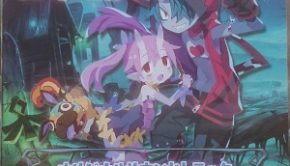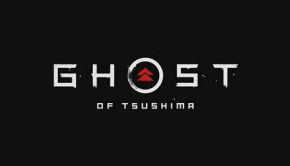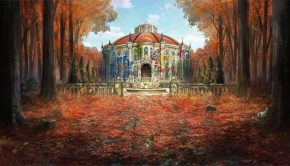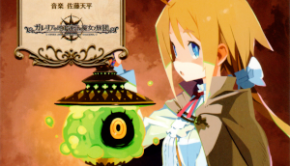Mugen Souls Z Soundtrack
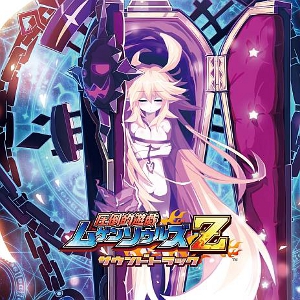 |
Album Title: Mugen Souls Z Soundtrack |
| Record Label: Team Entertainment |
|
| Catalog No.: KDSD-00629/31 |
|
| Release Date: May 1, 2013 |
|
| Purchase: Buy at CDJapan |
Overview
Mugen Souls Z is a recently-localised RPG sequel from Compile Heart that places you in the shoes of a megalomaniac Goddess. While the game’s quirky storyline might not be for all, its soundtrack is likely to appeal to most RPG fans. After all, it brings together Tenpei Sato and Kenji Kaneko once more to continue the musical vision created by the first game. How does the sequel’s music compare to that of the original?
Body
The first disc on the soundtrack is composed by Tenpei Sato. The first track on the CD is “Infinite Field,” which is used as the opening tune for Mugen Souls Z. It’s sung by Myou and has a pop rock sound and a bit of a Disgaea flair. It also sports a pretty nice guitar solo. Overall, it’s a playful, boastful song that fits the style of the game. The ending theme, “A Kiss that Looks Like You,” is a beautiful pop ballad that really has a charming sound to it. The use of harmonica is also appreciated as it helps give it more of jovial sound.
Tenpei Sato’s contributions tend to feature his staple sounds. “Cold Age Blues” isn’t really a blues tune, but filled with Sato staples nonetheless; it features some vocal work, a mysterious air to it and also some bright and airy moments thanks to the woodwinds and piano. While hardly a favorite of mine, it’s an enjoyable piece that boasts solid composition and implementation. Violin solos are showcased quite a bit in the playful “Spring Step”, beautiful “Lost Violin”, and more rustic “Brown Leaf Garden”. There are also some pieces that feature some playful woodwinds and brass. The peppy sound continues with “Happy Carnival”, a gospel-influenced tune reminiscent of Disgaea 3, and “Popn’ Clover”, a fitting piece that doesn’t stand up so well on a stand-alone basis. Among the moodier tracks, “Dark Legend” is an orchestral theme with a darker tone mixed with some bright woodwind work, and is very reminiscent of Sato’s orchestral tunes throughout his NIS game scores.
Sato contributes a few action themes as well. “Space Diving” has a very powerful atmosphere thanks to the beautiful mixture of rock, orchestra, synth, and choir. This is definitely one of the best new tunes from Mugen Souls Z. “Screming Wave” is a chaotic and mysterious orchestral tune; however, the tune doesn’t stand as strong as others on the soundtrack due to its somewhat random nature. Lastly, “Black Attack” is an awesome rock tune with some choral and orchestral backing. It really creates an effective battle environment. There are also some tunes that are rehashes from the first game and these are denoted by an added Z in the track title. It’s nice to hear some of these tunes again, but they aren’t significantly changed from the originals and hence won’t appeal much to those who already own the Mugen Souls soundtrack.
The second and third discs of the soundtrack is composed by Kenji Kaneko, similar to the first game. The main theme, “Mugen Souls Z” has has a very playful orchestral tune that would fit well in one of Tenpei Sato’s games. Among other event themes, “Vodka” is an energetic violin piece that has a very intense electronic sound with altering tempos and some heavy bass.“Reality like a Nightmare” is a sinister orchestral theme with some rock influence in the accompaniment, giving a sense of determination through dire times. “Future☆Ambitious” blends pop and classical influences in its orchestration, while “Mistake” is a suitably melancholy piano theme.
However, the world and dungeon themes are some of the highlights on the soundtrack. “Gray Seikai ~Aquarius~” sets the scene nicely with a sort of a renaissance feel. Reflecting the fusion sound that runs through the soundtrack, it also incorporates a lot of violin and deep bass with some electronic distortion at times. Fitting the high seas, “Red Seikai ~Scorpio~” is an orchestral tune with lots of heavy percussion and violin, while “Blue Seikai ~Gemini~” and “White Seikai ~Cancer~” emerge as favorites for the way they blend lovely electronic soundscapes with acoustic melodies. “Purple Seikai ~Pisces~” is another electronic based theme that is quite successful; it combines a House-influenced beat with some harp and woodwind incorporation to give a really airy feeling overall. However, “Silver Seikai ~Libra~” with its bright and bubbly synth/orchestra mixture, while interesting, is one of the more bland world themes on the soundtrack. Likewise, “Green Seikai ~Taurus~” is an upbeat theme that features plenty of woodwinds to give it a nice, delicate, and playful air, but it doesn’t really manage to stand out either. I wasn’t terribly impressed by “Ruins of Light ~A Angel’s Stairway~” on a stand-alone level either.
Moving to Kaneko’s darker contributions, “Ruins of Darkness ~Under Dark Shadow~” is an ominous orchestral theme with some haunting choral accompaniment, plenty of brass, and some ethnic percussion. “The Cave of Babylon” is a rock theme that has a bit of an ominous atmosphere; however, among the other rock themes, this one doesn’t stand up as strong. Still, it does have some really interesting accompaniment going on though. Among Kenji Kaneko’s battle tracks, “Broken Glass of Platinum ~Z~” is a riff heavy rock tune that also incorporates the organ and violin. It has a haunting atmosphere to it, but still has plenty of energy. “Stand Up and Fight” is another riff heavy rock tune that features violin as the primarily source of melody. It definitely has a more upbeat nature to it giving it a rather heroic sound. “We Will Rise Again” is similar in the riff department, but features an uplifting synth/guitar melody line. Lastly, the climactic “Requiem from Hell” is an intense orchestral tune that features frenetic strings and ominous chanting. Though somewhat generic, it fits its context perfectly.
Summary
In the end, I think that the Mugen Souls Z soundtrack is on par with that of the first game’s soundtrack. Both Kenji Kaneko and Tenpei Sato craft some fantastic tunes that fit the world of Mugen Souls; however, both of them also create tunes that may not be appreciated outside of the context of the game and aren’t among their best work. However, it is clear that the two work well together since I do hear some influence from one another in some of the pieces on the soundtrack. If you are a fan of the composers, or the music while playing it in game, this soundtrack may be for you.
Do you agree with the review and score? Let us know in the comments below!
3.5
Posted on May 25, 2014 by Don Kotowski. Last modified on May 25, 2014.

